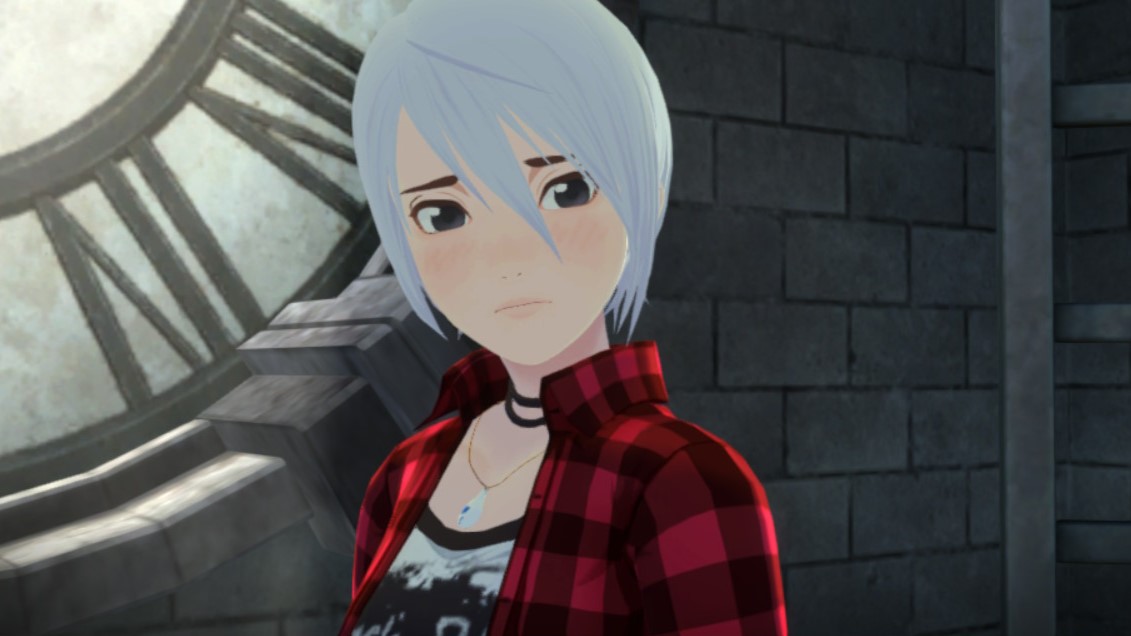TechRadar Verdict
Another Code: Recollection is a modernized way to experience two brilliant puzzle adventure games, but its slow pace makes it harder to recommend to those who aren’t already fans of the genre.
Pros
- +
Beautiful visuals
- +
Engaging narrative
- +
Perfectly balanced puzzles
Cons
- -
Awkward camera controls
- -
Slow pace not for everyone
Why you can trust TechRadar
Platform reviewed: Nintendo Switch
Available on: Nintendo Switch
Release date: January 19, 2024
Another Code: Recollection brings two cult classic puzzle adventure games to the Nintendo Switch. Containing both the Nintendo DS game Trace Memory (which was titled Another Code: Two Memories over in Europe and Japan) and its Nintendo Wii sequel Another Code: R - A Journey into Lost Memories, this collection represents the very first time that this latter title has been officially released in the US.
Far from being simple ports, however, Another Code: Recollection offers two full-on remakes that don’t shy away from making some pretty surprising changes to their source material. All of the puzzles across the two games have been fully reworked to take better advantage of the Nintendo Switch hardware and a smattering of additional scenes have been added to the first game.
The biggest alterations are evident in the new version of Another Code: R, however, which is substantially shorter than its original incarnation. A lot of work has also been done to try and bridge the gap between what was otherwise two quite mechanically and thematically disparate titles, including a significantly changed ending that, while still very in keeping with the tone of the original, makes it very difficult to declare whether this reimagining should be considered the definitive version.
Short and sweet
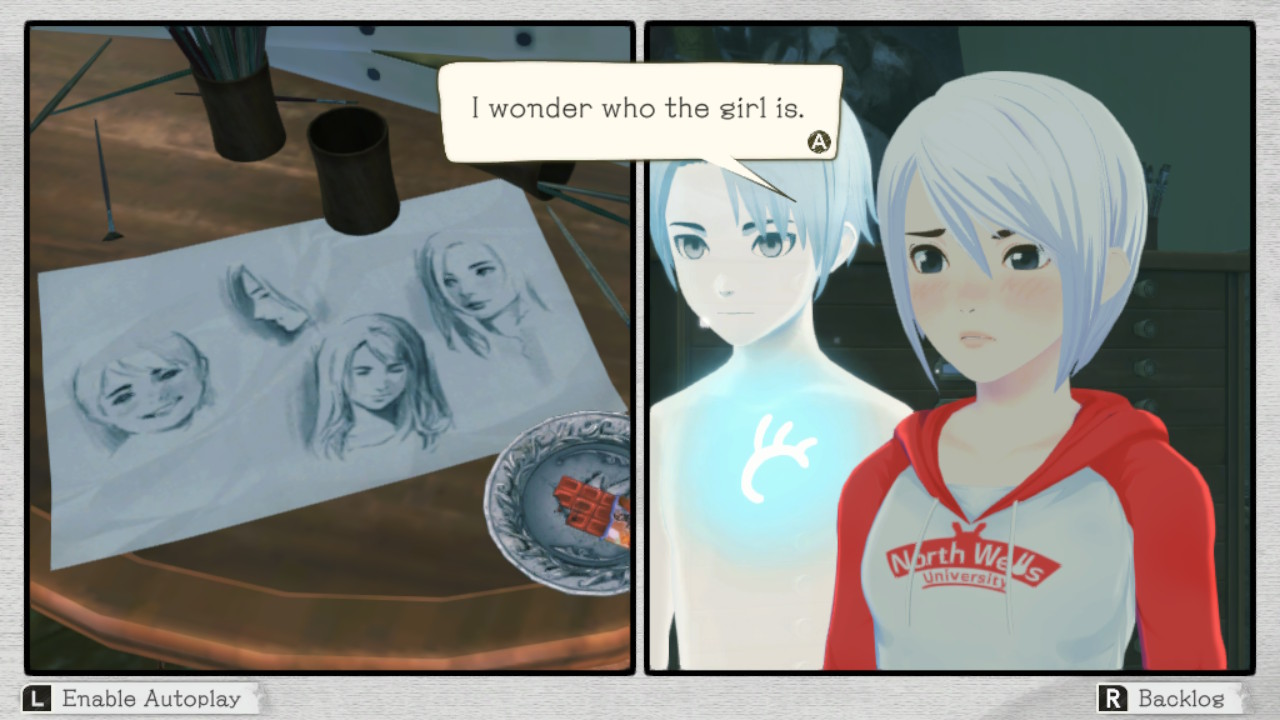
Set on the remote Blood Edward Island off the coast of Washington State, Trace Memory sees you take control of Ashley Robbins - a young teenager who has traveled to the island to reunite with her missing father. She’s joined by her aunt Jessica, who promptly goes missing in the grounds of the island’s mysterious ancient mansion leaving Ashley to try and get to the bottom of things.
Armed with the DAS (a suspiciously Nintendo Switch-shaped device that can take photos and store useful tidbits), you navigate around the environment and solve a series of puzzles to progress. You’re soon joined on your adventure by D, a young amnesiac ghost of a former mansion resident, and the pair agree to team up to find Ashley’s family and recover D’s lost memories.
While the DS game was played from a top-down perspective, Another Code: Recollection shifts the camera to a more modern third-person view with a full 3D version of the world to explore. It’s a major change, but one that seems like an appropriate way to help modernize what would otherwise be an unapologetically old-school adventure game. There are still some clear hallmarks of the portable format, however, like the small cast of characters and focus on compact interior areas.
It’s in some of these interiors that the new camera can become a little awkward, too. It’s extremely slow by default (which can mercifully be adjusted in the settings menu) and often hovers a little too close behind Ashley for comfort. Navigation is cumbersome when her upper body takes up so much screen space and, although it’s by no means a complete dealbreaker, it definitely detracts from the overall presentation at times.
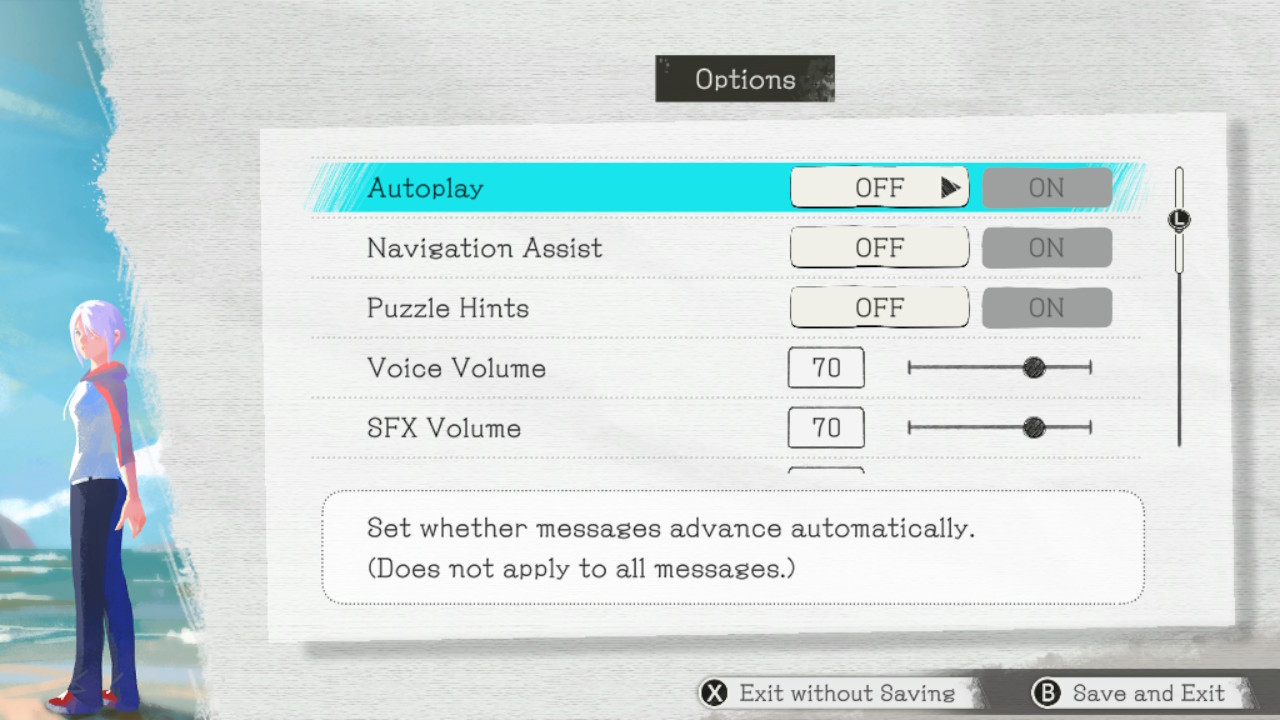
Another Code: Recollection features several accessibility options. This includes a variety of different hints for in-game puzzles, a navigation assist mode and an autoplay setting for dialogue. Voice acting is accompanied by text throughout.
Dialogue fares much better though, as it plays out in charming visual-novel sequences with shifting manga panel-style boxes and chunky bubbles of text as characters go back and forth. It’s a pleasant visual effect that perfectly compliments the attractive, painterly art direction and greatly enhances what would otherwise be a plain barrage of text. The new addition of voice acting similarly introduces a more cinematic quality to most scenes, though the very occasional instance of less-than-stellar line delivery during major narrative sequences is jarring.
The pace of events is often extremely slow, thanks in no small part to the sheer abundance of explanatory dialogue. However, Ashley and D make for a compelling pair, and the constant trickle of new clues makes it very difficult not to become wrapped up in their mystery if you’re a fan of a more traditional adventure. With supernatural elements and a hearty dose of sci-fi, it all pays off wonderfully in a memorable ending, too.
Pleasant puzzling
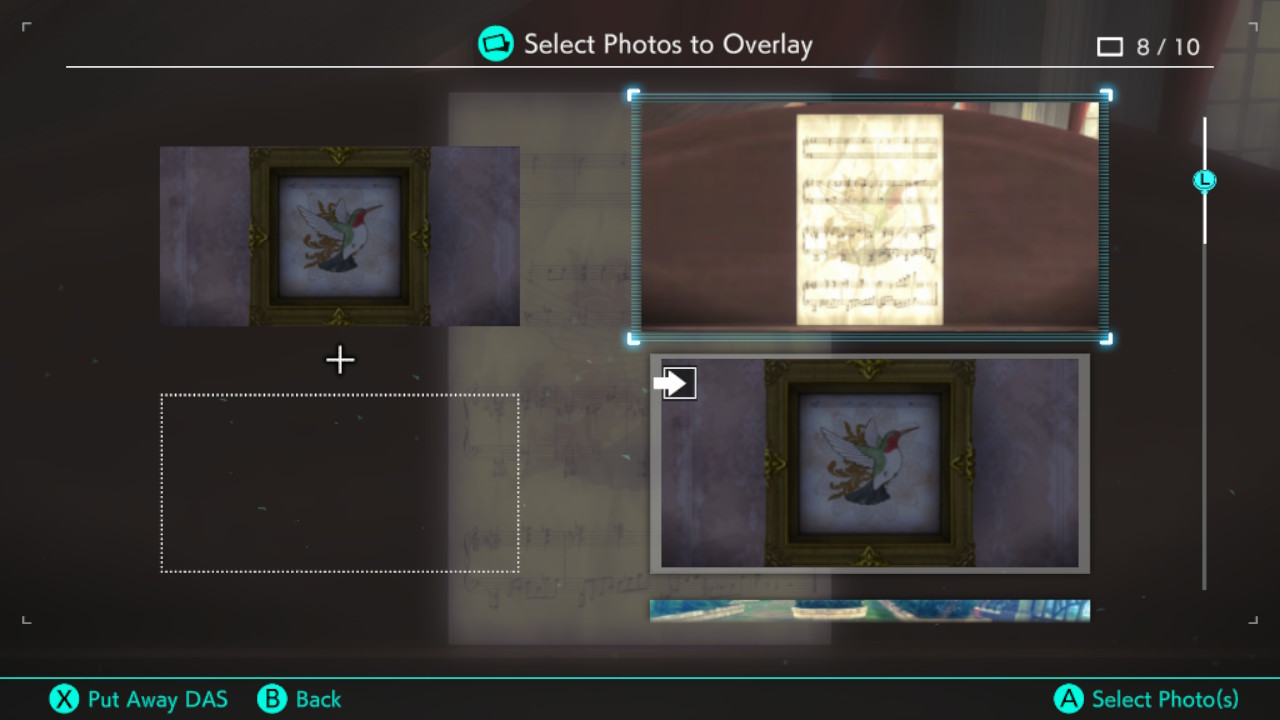
Given how much Another Code relied on DS hardware for its puzzle solving, making particular use of the stylus and touch-screen, it’s not too surprising that Another Code: Recollection takes things back to the drawing board in this respect. There’s a good variety of mechanics in the changed puzzles here, including the surprisingly frequent use of motion control for everything from tilting a stuck key through a miniature obstacle course to using a candle to uncover a hidden message on heat-sensitive paper.
These mechanics work well when they appear and the difficulty of the puzzles overall is almost perfectly balanced. Intriguing clues are hidden around the environment and there's plenty of optional character dialogue to help guide you.
If that’s not enough, some new settings do a great job of making the game more approachable. A handful of hints can be displayed on-screen at any time, walking you through each puzzle before finally revealing the complete answer - a great option to have if you’re entirely stumped. There’s also an optional navigational assist mode that highlights key items and adds a prominent compass around Ashley’s body that always points you in the right direction.
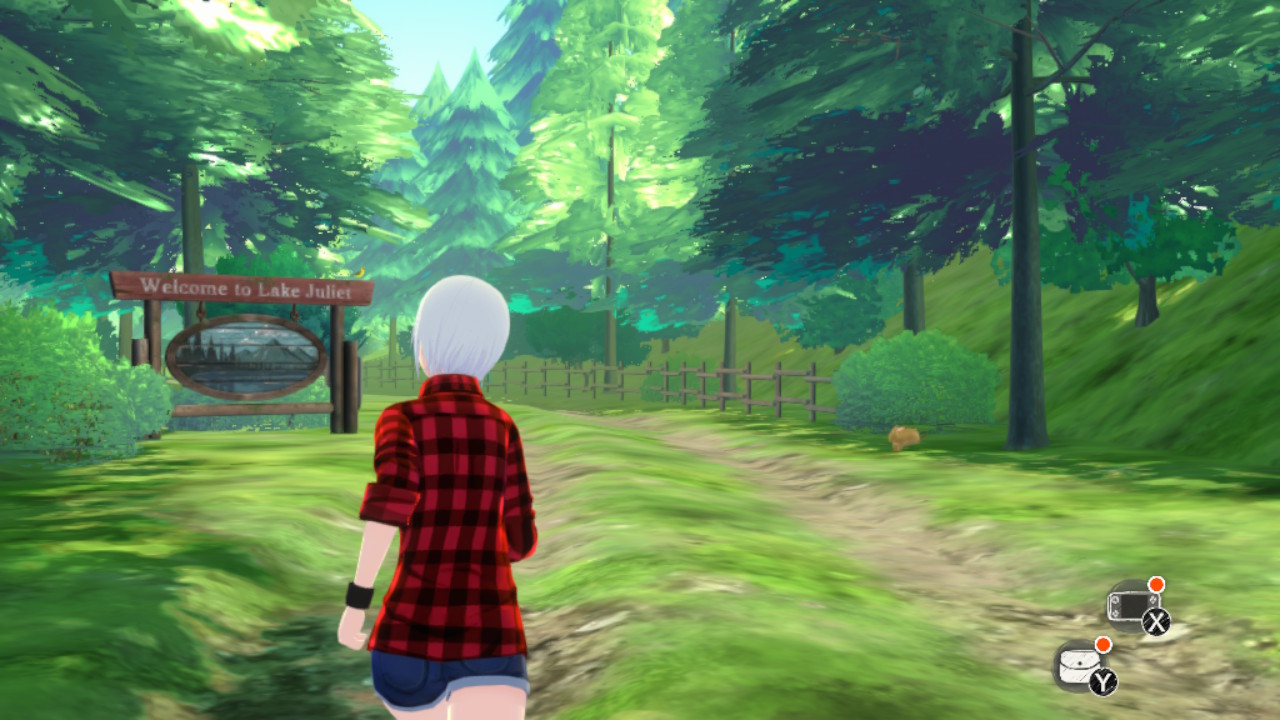
After spending hours in a confined mansion, the first time you step foot in the spacious Lake Juliet resort feels almost liberating. Exploring this fresh environment is often a literal walk in the park.
These are superb additions for newcomers that could come in especially handy as you move into the much larger environments of the second game, Another Code: R. Set two years later, it takes place in a sunny camping resort called Lake Juliet. You meet an older, stroppier version of Ashley who has been roped into a family camping weekend when she would much rather be at band practice with her friends. Things take a strange turn after she encounters a young runaway, however, and she begins to uncover a conspiracy that’s intimately connected with both her past and the history of the resort.
The more open structure of this sequel gives you a little greater freedom to explore at your own pace, taking in the lush scenery of the forest setting. Several new mechanics are introduced, including the RAS - a wrist-mounted version of the DAS that has you completing quick-time-event style code-breaking sequences to open electronic doors. Most of the puzzles are not hugely different from those found back in the mansion, though some stand-out favorites - like a segment that sees you trying to recover a floating briefcase with a remote control boat - offer more than enough variety to keep things fresh.
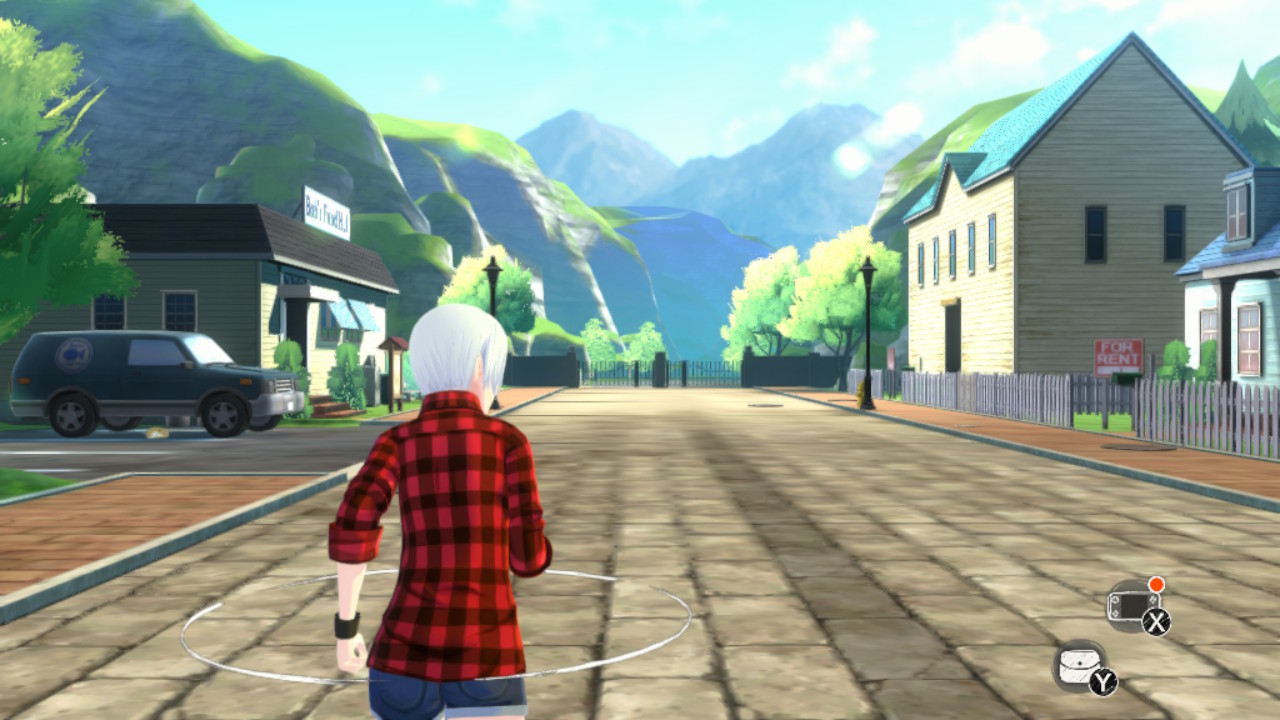
The approach taken with the story of Another Code: R is a little baffling, though. While it’s safe to say that the original runtime of over 15 hours was far too long, cutting about nine hours of content and dramatically changing the ending is a bold choice for a remake. Thankfully, the new story elements feel right at home and the cut content consists mainly of quite repetitive sections. However, it’s still easy to see why some might prefer the original version and, while it makes Another Code: Recollection considerably more interesting for returning players, it’s difficult not to think that newcomers are missing out on the ‘true’ experience.
Either way, Another Code: Recollection is still an enjoyable adventure with plenty of puzzles and a narrative that makes it well worth experiencing - especially now that it’s more approachable than ever.
For more Nintendo Switch game recommendations, see our guides to the best Nintendo Switch games or the best cozy Switch games.

Dash is a technology journalist who covers gaming hardware at TechRadar. Before joining the TechRadar team, he was writing gaming articles for some of the UK's biggest magazines including PLAY, Edge, PC Gamer, and SFX. Now, when he's not getting his greasy little mitts on the newest hardware or gaming gadget, he can be found listening to J-pop or feverishly devouring the latest Nintendo Switch otome.
